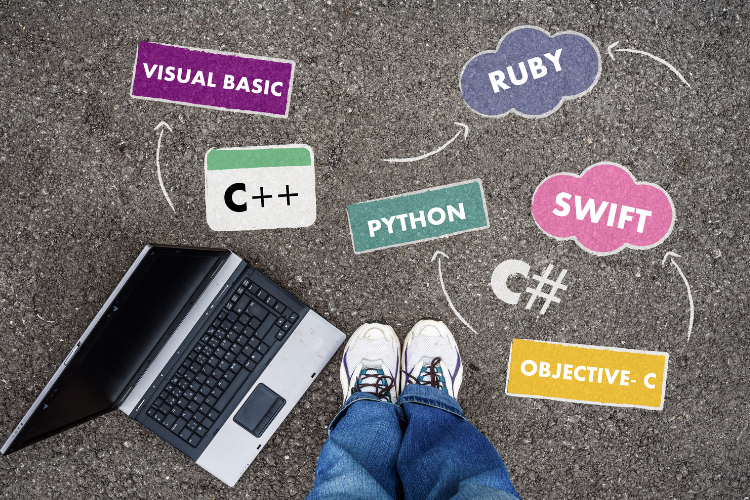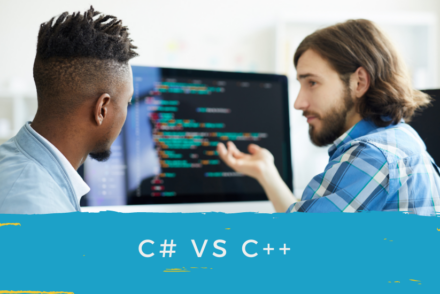Full-stack developers boast of their fluency in multiple coding languages. Java and C++ are two languages that stand out, among many others. Often, novice developers have difficulty deciding which languages they should learn first.
Both Java and C++ are general-purposes, object-oriented languages. The languages use similar syntax and a conceptual paradigm based on abstract and concrete data types. Some developers argue that C++ is better suited for low-level operations, while others think Java is the best web development language.
The truth about whether one language is “better” than another depends on what kind of programmer you want to be—what you need the programming language for, and the skills you already have in other languages.
This article will help you discern the essential differences between these two languages and decide which one is right for your programming skillset.
Main Differences between Java vs C++
The main differences between Java vs C++ are:
- C++ is platform dependent whereas Java is platform-independent
- C++ is dynamically typed, whereas Java is statically typed
- C++ supports goto statements whereas Java doesn’t
- C++ supports structures and unions, whereas Java only supports classes
- C++ relies on third-party libraries for thread support, whereas Java has inbuilt thread support
- C++ executes data faster because of its low memory footprint, whereas Java is easier to use for larger projects because of its high memory footprint.
Factors to Consider Before Selecting a Programming Language to Learn
When deciding to learn a programming language, there are a few factors you should consider:
The Language’s Purpose
What kind of programming do you want to do? Understanding this aspect of a programming language will give you an idea of the different ways in which you could use it.
The Language’s Popularity
How popular is the language? What are the job prospects like for someone proficient in this language? How many resources (books, websites, etc.) are available to help you learn the language? The main benefit of learning a popular language is the wealth of resources available to help you understand it.
Languages You Already Know
It’s easier to learn a new programming language if you know one or more languages. While most novice developers would benefit from learning a new language rather than working with ones they already know, it’s good to have a few programming languages under your belt.
The Language’s Community Support
Developer communities such as StackOverflow are active spaces where you can get help from fellow developers and share your knowledge with others.
If a language is well-supported on the internet—with a large community of developers and a high level of activity—you’ll have an easier time finding answers to your questions when you get stuck.
Ease of Learning
Some languages are easier to learn than others. Most programming language guides will include a difficulty rating in the form of “learnability.” The difficulty level shouldn’t deter you from learning a new language, especially if you plan to use it exclusively for certain types of operations.
Introduction to C++
C++ is a statically typed, compiled language designed by Bjarne Stroustrup and released in 1985. It is the brainchild of Stroustrup as an enhancement to the C programming language.
C++ inherits all the features of C and builds on them with object-oriented programming (OOP) features such as classes, inheritance, polymorphism, and virtual functions. C++ also supports generic programming through template metaprogramming.
It allows you to create classes and functions that work with any data type without writing separate code for each data type.
Developers use C++ for systems programming or where performance is paramount; programmers can also use it for developing cross-platform applications that use graphical user interfaces (GUIs) and mobile apps.
Core Features of C++
C++ offers developers many features that make it an attractive language choice for many purposes. Some of its core features include:
Object-Oriented Programming
While C is a procedural language, C++ is an object-oriented programming (OOP) language. The OOP features of C++ let you organize code into reusable classes. Classes are collections of variables and functions that define an object’s structure, behavior, and interactions.
Through the OOP functionality, data abstraction, inheritance, polymorphism, and encapsulation are all possible with C++. The OOP features of the language make it easier to develop large-scale software applications.
Cross-platform
C++ is a cross-platform language. You can create applications that run on different hardware and operating systems. This feature makes it a popular choice for developing video games, mobile apps, and desktop applications.
Standard Library
The C++ standard library is a comprehensive collection of functions and classes that let you do everything from file input and output to complex data structures and algorithms.
It also allows you to get graphics, build GUIs, work with dates and times, develop complex data structures like stacks and queues, process text using regular expressions, and perform string processing.
Compiler Based
C++ is a compiled language. This feature means the code you write needs to be processed by a compiler that translates into machine code or bytecode before running it in your application. Compilers perform syntax checking and identify any errors during this process before generating an executable file for your application.
Dynamic Memory Allocation
A computer can’t access more memory than it has available, so the language must have some way of handling requests for additional memory. The language accomplishes dynamic memory allocation through either heap or stack data structures.
The C++ standard library includes a set of classes that let you perform dynamic memory allocation on both types of data structures.
Intermediate Level Programming Language
C++ is an intermediate-level programming language. It supports low-level (machine-level) language and high-level programming language features. It is a less cryptic language than assembly and has a greater level of control than high-level languages.
Introduction to Java
Java is a server-side programming language. It is a general-purpose, concurrent, class-based, object-oriented programming language developed by James Gosling and friends at Sun Microsystems in 1995.
It is a language designed to write once, run anywhere (WORA). As a WORA language, developers can compile Java applications once and deploy them on multiple platforms without recompiling the code.
The compiler generates bytecode, machine code for the Java Virtual Machine (JVM), so developers don’t have to worry about the platform. The JVM makes use of a just-in-time compiler (JIT), so Java applications run as natively as possible on supported platforms.
Core Features of Java
Java includes several features that make it an attractive choice for many developers. Some of its core features include:
Object-Oriented Programming
Java is a pure object-oriented programming language, so all code and data types inherit Java.lang.Object. It has the basic OOP concepts of encapsulation, inheritance, polymorphism, and abstraction. These OPP concepts allow developers to create reusable tools without jeopardizing security.
Platform Independent
One of Java’s most notable features is that it’s platform-independent. Developers compile their code to bytecode, which can run on any platform that supports a JVM. This feature makes it possible to develop cross-platform desktop and mobile applications.
Robust Library
The Java Class Library is a comprehensive collection of classes and interfaces. It lets developers do everything from network programming to creating graphical user interfaces (GUIs). Java also includes support for threading, database access, and XML parsing.
Secure
Java is one of the most secure programming languages available today. The language provides comprehensive security features to write code resistant to malicious attacks. The Java program runs on a sandbox, which restricts access to system resources and eliminates the risk of malware.
Architectural Neutral
Java is an architecturally neutral language. This feature means developers can write a program once and compile it for multiple platforms without changing the source code. The compiler generates platform-independent bytecodes so that the same program can run on different hardware and operating systems.
High Performance
Java is a high-performance programming language. The Java Virtual Machine (JVM) uses a just-in-time compiler to compile Java bytecodes into native code, so Java applications run as quickly as possible.
The JVM also uses a garbage collector to reclaim unused memory, so Java applications require less memory than traditional software.
Note that Java is an interpreted language. It may not be as fast as compiled languages like C or C++, but it ensures high performance on various platforms.
Improved Polyglot Programming
Polyglot programming in Java refers to using more than one programming language within a single application. For example, you can combine Java and SQL or Java and HTML to make a feature-rich program. Through JavaFX, developers can also create cross-platform GUIs using Java.
Differences Between C++ and Java
To make an informed decision about which language to learn, you should understand the differences between C++ and Java.
Memory Management
Memory management in C++ is entirely manual, but Java uses automatic garbage collection. Memory management is when the computer reclaims the memory that’s no longer in use. Garbage collection means Java automatically allocates and frees memory in response to program changes.
As a novice developer, memory management may not be an essential feature for you. However, as your skills and projects grow, this difference may become more significant. C++ is more effective at memory management than Java, but the automatic garbage collection in Java is better for debugging.
Performance
As an interpreted language, Java is slower than compiled languages like C++. However, the Java Virtual Machine (JVM) ensures that Java code runs quickly on various platforms. C++ has a lighter memory footprint than Java, which leads to faster execution.
If you’re switching from C++ to Java or vice versa, make sure you test your code for performance and memory issues. Learners new to either language should not expect miracles regarding performance. It requires experience and effort to write high-performance code.
Syntax
The Java inspiration came from C and C++. The two languages may share some similarities in terms of syntax, but there are differences. Java is less verbose and descriptive than C++. This feature makes it easier for programmers to code quickly. It also makes the code more concise and readable.
Main Use of Language
The initial goals for developing Java were to create a simple, robust, and easy to learn. These goals continue to influence the design of Java and its use.
C++ is used more for systems programming, software development, and low-level tasks. Java is used more for web development, enterprise applications, mobile apps, and graphical user interfaces (GUIs).
Learn Java if you intend to use a language for web development or mobile app development. If you have other plans in mind, C++ is a better option.
Platform Independent
C++ is a compiled language, so the code needs to be translated into platform-specific machine code before running. However, Java is an interpreted language, so there’s no need for translation, and you can run and test your program on any operating system (OS).
In a basic sense, C++ is platform dependent while Java is platform-independent. This difference can have an impact on your project management. If you need to support multiple platforms, choose Java over C++.
Learning Curve
Java has a gentle learning curve. It is less complex than C++ and has a straightforward syntax. The language also has extensive online documentation, making finding the answers you need easier.
C++ has a steeper learning curve and can be challenging to learn. However, C++ offers more features and flexibility than Java. If you are willing to put in the effort, C++ can be a more robust language.
Community Support
According to Statista, Java is more popular than C++. The study reveals that Java had 49% popularity among developers in 2021, while C++ had 23%.
This difference in popularity impacts the level of community support you can expect. Insights from StackOverflow show that 35.35% of developers used Java compared to C++ with 24.31%.
If you want to find help and support for your coding challenges, Java is the better option. The Java community is large and active, and you can find online forums, StackOverflow answers, and libraries for Java.
Similarities between Java and C++
The two languages may not be identical, but they share some features.
Object-Oriented Programming (OOP)
Java and C++ are object-oriented languages. OOP is a popular coding paradigm that facilitates code reuse, extensibility, and readability.
Application Programming Interface (API)
An API is a set of definitions that facilitate communication between components. The Java Virtual Machine (JVM) has an extensive API that you can use to interact with the machine and other programs. C++ also has a comprehensive API that developers can use to perform various tasks.
Identical Comments Syntax
Both languages use two slashes (//) to comment.
Conditional Statements are Similar
In both languages, the three main conditional statements (if, else, and switch) are identical.
Support for Multiple Programming Paradigms
Java and C++ support a variety of programming paradigms, including object-oriented programming, procedural programming, and functional programming.
Garbage Collection
Java and C++ use garbage collection to manage memory. When a program no longer needs an object, the garbage collector removes the object from memory.
Library Support
Java and C++ have extensive libraries to use in your programs. The libraries contain code snippets that you can borrow to save time and effort in coding.
Other Programming Languages You Should Learn
C++ and Java are not the only languages you should learn if you want a career in software development. The popularity of C++ and Java resulted in the creation of modern programming languages such as Python, JavaScript, PHP, Rust, and Swift. Learning these alternative languages will make you more marketable in the job market.
Depending on your interests and plans, here are some languages you can learn:
- Python: Python is a general-purpose, high-level programming language that some consider a simpler version of Java. It’s similar to C++ because it uses digital certificates for authentication and supports multiple programming paradigms.
- JavaScript: Javascript is another alternative to Java and C++ on the front-end side of programming. You can, however, use it in back-end development with Node.js.
- PHP: PHP is a scripting language used for web development. It’s popular because it’s easy to learn and can be used on various platforms, including Linux, Windows, and macOS.
- Rust: Rust is a systems programming language similar to C++. It offers features that younger languages like Java and Python do not.
- Swift: Swift is an alternative to C++ on the iOS platform. Created by Apple, Swift is a powerful and fast programming language that makes development on Apple products easier.
Should I learn C++ or Java? (FAQs)
Answer: Career-wise, what you want to do determines the language you should learn. Java is the better option if you want to work with front-end development because it’s easier than C++.
If you want to work on the back-end or systems side of programming, learning C++ is a better idea. But to be a full-stack developer, learning both languages is the best option.
Answer: Java is an easier language to learn. The syntax is more straightforward than C++, and most popular programming languages use Java. C++, on the other hand, is considered a more complex language because it’s hard to master and requires an in-depth understanding of pointers and references.
Answer: Most developers prefer using Java because it’s easier to debug and understand. But C++ is more efficient and performs better than Java on some tasks because it uses compiled binaries that make it a faster language.
The Bottom Line: Should I Learn C++ or Java?
C++ and Java are two of the most popular programming languages globally. As a novice software developer, I recommend starting with Java. By doing so, you’ll gain a strong foundation in object-oriented programming and be prepared to learn other languages.
Moreover, if you’re already familiar with C++ or another C-based programming language, learning Java shouldn’t be too difficult. Learning both languages is essential if you want to be a software developer.
However, don’t stop at C++ and Java. It would be best to learn alternative programming languages, such as JavaScript, Python, PHP, and Swift. These are the most popular languages among employers, so they’re worth learning to boost your career.
- CISSP vs CISM: Which Certification is Right for You? - December 11, 2021
- Should I Learn C++ or Java - December 8, 2021
- C# vs C++: What’s the Difference? - November 28, 2021











No Comments